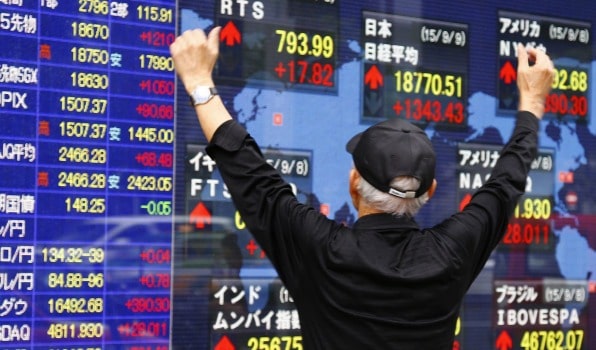
Asian markets were mixed early on Monday while oil prices edged up after recording six straight days of declines.
South Korea’s Kospi advanced 0.54 percent, with heavily weighted technology stocks higher in the morning. Samsung Electronics rebounded 1.43 percent and SK Hynix gained 0.82 percent. Financials also traded higher in the early going.
Shipbuilders were mostly in negative territory, with Samsung Heavy down 1.81 percent. Hyundai Heavy Industries was flat after it reported a miss on fourth-quarter earnings on Friday after the market close.
Over in Australia, the S&P/ASX 200 slipped 0.64 percent as earnings season continued Down Under. Energy-related stocks were down 1.06 percent in the morning after oil prices slid for the sixth straight session on Friday. Santos fell 1.24 percent and Beach Energy lost 3.31 percent.
Gold producers were also weak: Newcrest Mining and Evolution Mining were down 1.22 percent and 3.23 percent, respectively. Australian retailers were in the red, with Myer underperforming its peers in the sector and trading down 4.7 percent early on.
The heavily weighted financials sub-index was off by 0.64 percent.
Japanese markets are closed on Monday in observance of a public holiday.
Heavy declines were seen in Asian markets last week: Japan’s Nikkei 225 closed lower by 2.32 percent in the previous session and was down 11.38 percent from its 52-week high as of Friday.
Greater China markets were some of the worst performers last week, with the Shanghai composite down 12.75 percent from its 52-week high and Hong Kong’s Hang Seng Index 11.88 percent below its 52-week high as of Friday.
Those losses mirrored declines seen stateside on investor concerns over rising interest rates. The global rout in stock markets began earlier this month when the Dow lost 666 points after a stronger-than-expected jobs report saw U.S. bond yields rise.
Markets stateside closed higher in the last session although last week was their worst in two years. The Dow Jones industrial average rose 330.44 points, or 1.38 percent, to finish the day at 24,190.90.
Despite those gains, the Dow still finished the week lower by 5.2 percent.
“The severity of the falls globally … suggest we may have already seen the worst, but with bond yields likely to go back up further and uncertainty about how much the unwinding of short volatility positions has to go, further weakness cannot be ruled out in the short term,” Shane Oliver, head of investment strategy at chief economist of AMP Capital, said in a Friday note.
Still, in the absence of a recession, “the pullback is just another correction,” Oliver added.
Also of note, President Donald Trump on Friday signed a roughly $300 billion budget plan into law after the U.S. Congress passed the bill earlier that day.
On the commodities front, oil prices were steady after sinking on Friday for a sixth straight day. Those declines came on the back of rising production and the firmer dollar last week.
U.S. West Texas Intermediate edged up 0.29 percent to trade at $59.37 per barrel after falling below the $59 level on Friday for the first time this year. Brent crude futures inched higher by 0.06 percent to trade at $62.83.
In currencies, the dollar index, which tracks the U.S. currency against a basket of rivals, stood at 90.352. Against the yen, the dollar was mostly stable at 108.77 at 8:06 a.m. HK/SIN.
The Australian dollar was steady at $0.7821.
What’s on tap
Here’s the economic calendar for Monday (all times in HK/SIN):
- 1:00 p.m.: Singapore retail sales
- 5:00 p.m.: China new yuan loans
- 8:00 p.m.: India industrial output
- 8:00 p.m.: India January Consumer Price Index
